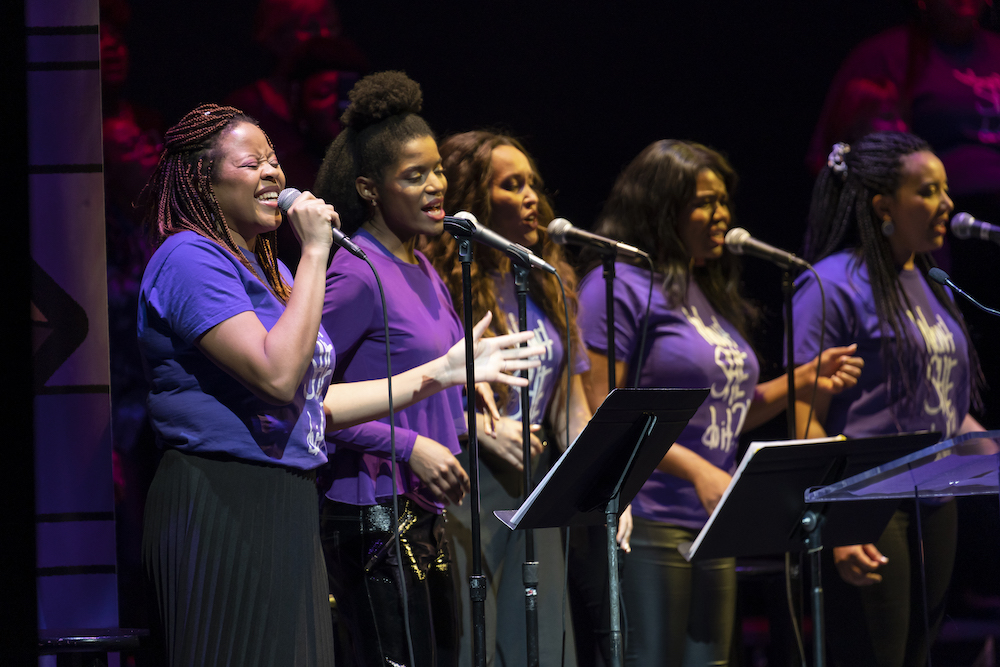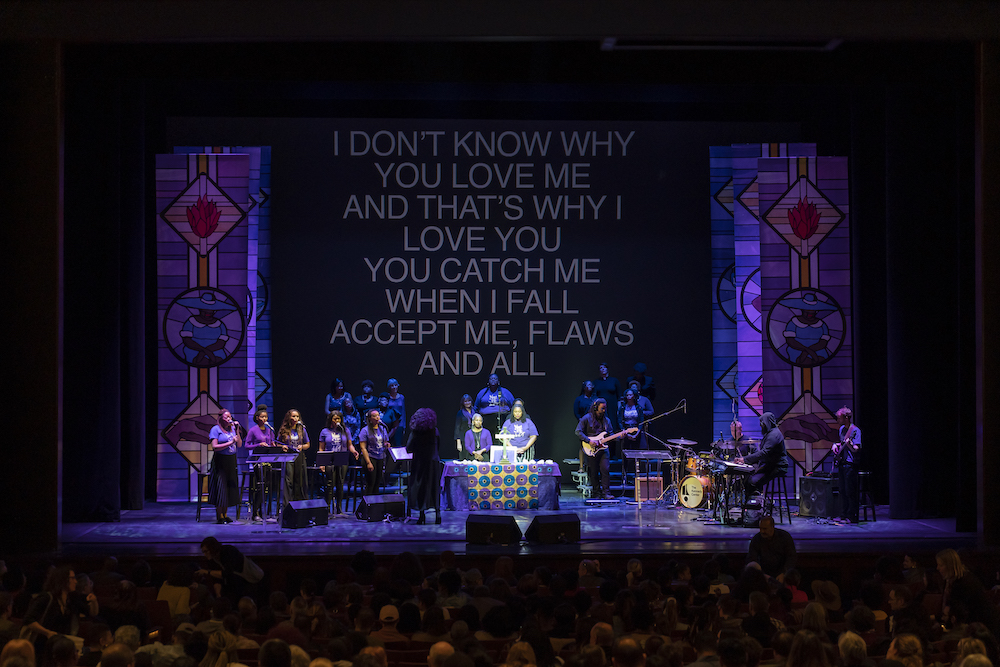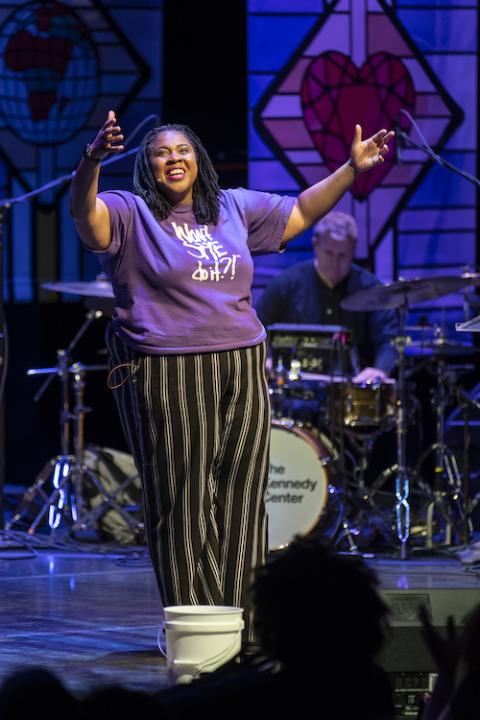
Vocalists performing at the Beyoncé Mass March 8 at the Kennedy Center in Washington, D.C. (Kennedy Center/Scott Suchman)
I've never been to a Beyoncé concert before, but I assume there's always a line at the entrance. Probably a long one, like this one, that extended out the door of the Kennedy Center and along the front of the building.
Of course, "Queen Bey" was not actually slated to perform this Sunday evening, March 8. Nobody was. Those in line were not going to a performance at all. They were going to a worship service – the "Beyoncé Mass."
I briefly waited in line with Jazmin Pruitt, a 20-something recent graduate of Georgetown University. She said that when she told her friends she was attending the event, they asked her, "You're going to worship Beyoncé?"
The question is funny, though not entirely ridiculous. Beyoncé's fans are among the most loyal in the history of pop. Her worldwide adoration is rivaled only by that of the most iconic pop figures of the past — Michael Jackson, Prince, Madonna. Pruitt herself proudly told me she is a member of the "Bey Hive" and, like Beyoncé, a Houston native.
But worshipping Beyoncé? "That's not what this is about," she said.
What the Beyoncé Mass is about, according to the event's program, is fostering "an empowering conversation about Black women — their lives, their bodies, and their voices." Beyoncé's music is purely a tool for accomplishing that.
As I took my seat inside the theater and scanned the audience around me, it was clear that although this conversation is about black women, it is not one limited to being only for black women. People of all races, genders and ages came together to celebrate. A man seated behind me said he saw the event advertised on social media and decided to come alone.

The Beyoncé Mass held March 8 at the Kennedy Center in Washington, D.C. (Kennedy Center/Scott Suchman)
Mass began at 6 p.m. with a recording of Beyoncé singing the hymn "Lift Every Voice." As the song played, the choir took its place and the Rev. Yolanda Norton walked to the front of the stage. Norton, a minister Christian Church (Disciples of Christ) and the event's organizer, is confident and charismatic.
"Clap, dance, sing, shout," she told the packed theater, inviting everyone to stand. "This is how we worship God."
Suddenly, the all-male band started playing, the all-female choir started singing and the audience did exactly as Norton instructed.
I'm a survivor, I'm not gon' give up
I'm not gon' stop, I'm gon' work harder
I'm a survivor, I'm gonna make it
I will survive, keep on surviving.
With the crowd energized, Norton then issued her official welcome.
"This is womanist worship," she said. "If you've never felt seen before, know that we see you. … You are exactly what God had in mind when she made you."
The term "womanism" is often attributed to the novelist Alice Walker, best known for writing The Color Purple. In her 1983 collection of essays, In Search of Our Mothers' Gardens: Womanist Prose, Walker defined a womanist as "a black feminist or feminist of color… A woman who loves other women, sexually and/or nonsexually… Womanist is to feminist as purple is to lavender."
Perhaps as an homage to Walker, perhaps because it's Lent, or perhaps due to both reasons, the Beyoncé Mass stage was adorned completely in (the color) purple, including the vocalists in their matching purple T-shirts.

The Rev. Yolanda Norton at the Beyoncé Mass March 8 at the Kennedy Center in Washington, D.C. (Kennedy Center/Scott Suchman)
Although womanism was originally a response to white feminism, it has had a rich impact on theology over the decades as well, according to Catholic womanist scholar Diana Hayes of Georgetown.
"It was because the black woman was absent from both feminist theology and black theology that some black women began to say we have our own story to tell," Hayes told U.S. Catholic in a 1997 interview.
Norton is now building on that legacy, artfully using the lyrics of Beyoncé to help tell current stories of black women in America, stories which includes tremendous pain and loss.
During a rendition of the song "Heaven," a screen in the back of the stage showed a series of images of women's faces. "TeeTee Dangerfield. Sandra Bland. Atatiana Jefferson," the names of black women killed in recent years were read aloud.
Heaven couldn't wait for you.
No, Heaven couldn't wait for you
So go on, go home.
"Y'all, I'm tired," Norton said when it came time to deliver her sermon.
"I'm tired of talking about love in the face of people who are filled with hate. I'm tired of turning on the television and seeing the blood of black bodies running in the street. I'm tired of brown people being turned away at borders that welcome white folks. I'm tired of being ignored, tired of people trying to appropriate my identity. I'm tired of people calling me an angry black woman as if I don't have a right to be angry. …
"And yet, despite all the ways that we might get tired in this life, God is calling us to be agents of peace and justice and deliverance in this world," she said.
"The best prayer that we have as God's people is with our feet," Norton implored the audience, pushing everyone to move out of their comfort zones and take action that shows that "God is a God who lives all over the world."
Advertisement
After a couple more songs, a womanist version of the Lord's prayer and a knuckle-touch heavy sign of peace, the ceremony wrapped with a cover of Beyoncé's "Start Over."
Let's start over
We can't let our good love die
Maybe we can start all over
Give love another life.
Walking out of the theater, I saw a group of friends, all elderly black women, greeting each other with hugs and quoting the lyrics, "Let's give love another life." It was then that I realized that, although we just spent an hour listening to her music, I couldn't remember having heard Beyoncé's name being mentioned even once during the service. Like Jazmin Pruitt told me on my way in — Beyoncé the pop star, in fact, was not at all what the Beyoncé Mass was about.
The mass was a living example of Norton's sermon message: taking action to show God's presence in all things, including beloved pop music.
As Norton put it in her sermon, "Just because God is not mentioned does not mean that God is not present."
[Jesse Remedios is an NCR staff writer. His email address is jremedios@ncronline.org. Follow him on Twitter at @JCRemedios.]






